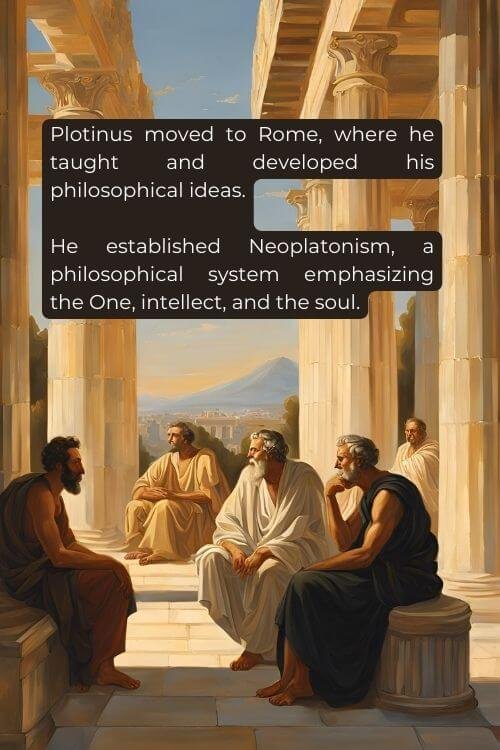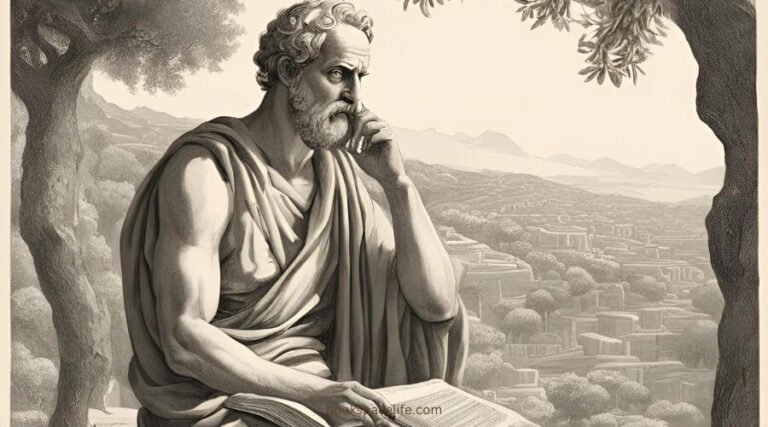Thales of Miletus
Plotinus: The Philosopher of the One and the Soul
Plotinus (204 – 270 CE), a pivotal figure in the development of Neoplatonism, was a philosopher whose ideas profoundly influenced the course of Western thought.
Born in the 3rd century CE, he sought to integrate the teachings of Plato with other philosophical traditions, establishing a system of thought that emphasized the nature of the One, the essence of reality, and the path of the soul toward enlightenment.
This blog post delves into Plotinus’s life, his travels and education, his philosophical contributions, and his lasting impact on both ancient and modern philosophy.
Quick Read
Table of Contents
(1) Early Life and Education
Plotinus was born around 204 CE in Lycopolis, a city in Egypt. The details of his early life remain largely obscure, but it is known that he was of Greek descent.
As a youth, Plotinus displayed a keen intellect and a deep interest in philosophy, leading him to pursue a rigorous education.
At around the age of 28, Plotinus moved to Alexandria, one of the great cultural and intellectual centers of the ancient world.
There, he began studying under the philosopher Ammonius Saccas, a notable figure in the development of Neoplatonism.
This period in Alexandria was crucial for Plotinus, as it exposed him to a wide range of philosophical ideas, including Platonic, Aristotelian, and Stoic thought.
His education was characterized by a focus on metaphysics and ethics, laying the groundwork for his later philosophical explorations.

(2) Travels and Influences
Around 243 CE, motivated by his quest for knowledge and understanding, Plotinus undertook a journey to Persia and India.
During his travels, he sought to explore Eastern philosophies, particularly those related to mysticism and spirituality.
Though details of his experiences in these regions are sparse, it is believed that he was influenced by the mystical traditions of these cultures, which would later inform his own philosophical outlook.
Upon returning to Rome around 244 CE, Plotinus began to teach and develop his philosophical ideas more systematically.
He established a school of philosophy and attracted a group of students, including the notable philosopher Porphyry, who would go on to play a significant role in disseminating Plotinus’s teachings.
(3) Philosophy of Plotinus
Plotinus’s philosophy is characterized by a complex metaphysical system that revolves around several key concepts:
- The One: At the core of Plotinus’s thought is the concept of “the One,” an ineffable and transcendent reality that is the source of all existence. The One is beyond all attributes and distinctions; it is absolute unity and simplicity. From the One emanates the entire cosmos, representing the process of creation and the unfolding of reality. This idea draws heavily from Plato’s concept of the Good and serves as the foundation for Plotinus’s metaphysical framework.
- Emanation: Plotinus introduced the notion of emanation as a way to explain the relationship between the One and the rest of existence. According to this view, everything in the universe emanates from the One in a hierarchical fashion. The first emanation is the Nous (Divine Mind), which contains the Forms (ideal archetypes of all things). From the Nous emanates the World Soul, which brings life to the material world. This process of emanation illustrates the interconnectedness of all levels of reality, from the divine to the material.
- The Soul and the Body: In Plotinus’s philosophy, the human soul plays a crucial role in the pursuit of spiritual enlightenment. The soul is seen as a fragment of the divine, capable of ascending toward the One through philosophical contemplation and ethical living. Plotinus emphasized the importance of inner transformation and the cultivation of virtue as means of achieving this ascent. The soul’s connection to the body is viewed as a temporary condition; the body is seen as a hindrance to the soul’s spiritual journey.
- Intellectual Contemplation: For Plotinus, intellectual contemplation is the highest form of knowledge. He believed that through contemplation, individuals could access the deeper truths of reality and ultimately experience union with the One. This process involves transcending the material world and the limitations of sensory perception to attain a direct experience of the divine.
- Mystical Experience: Plotinus’s thought is also characterized by an emphasis on mystical experience as a means of connecting with the divine. He believed that through deep contemplation and spiritual practice, individuals could achieve moments of profound insight and unity with the One. These mystical experiences are often described as ineffable and transformative, leading to a sense of ultimate fulfillment.

(4) Influence and Impact
Plotinus’s ideas have had a profound and lasting influence on the course of philosophy, theology, and mysticism, shaping the intellectual landscape of both the ancient and modern worlds.
- Neoplatonism: Plotinus is often regarded as the founder of Neoplatonism, a philosophical movement that sought to reinterpret and expand upon Platonic thought. His ideas on the One, emanation, and the nature of reality became foundational for later Neoplatonists, including Porphyry, Iamblichus, and Proclus. This philosophical school became a dominant force in the intellectual tradition of late antiquity, influencing Christian, Jewish, and Islamic thought.
- Christian Theology: Plotinus’s concept of the One and his emphasis on the spiritual ascent of the soul resonated with early Christian theologians. Thinkers like Augustine were influenced by his ideas, integrating elements of Neoplatonism into their theological frameworks. The notion of a transcendent God and the importance of inner contemplation found common ground in both Plotinus’s philosophy and Christian theology.
- Renaissance Humanism: During the Renaissance, there was a resurgence of interest in Neoplatonism as scholars sought to reconcile ancient philosophy with contemporary religious thought. Thinkers such as Marsilio Ficino and Giovanni Pico della Mirandola drew heavily from Plotinus’s writings, emphasizing the importance of the soul’s ascent and the integration of philosophy with spirituality.
- Modern Philosophy: Plotinus’s emphasis on the unity of existence and the relationship between the divine and the material world can be seen in the works of modern philosophers such as Hegel and Heidegger. His ideas about the nature of reality and the importance of self-reflection continue to resonate with contemporary discussions in metaphysics and existential philosophy.
- Mysticism and Spirituality: Plotinus’s focus on mystical experience and the inner journey toward enlightenment has left a lasting legacy in various spiritual traditions. His writings have inspired countless individuals seeking spiritual fulfillment, and his teachings are often cited in discussions of Eastern and Western mystical philosophies.
- Psychology and Consciousness Studies: Plotinus’s exploration of the inner life of the soul and the process of self-discovery has implications for contemporary psychology, particularly in the fields of transpersonal psychology and consciousness studies. His insights into the nature of experience and the transformative potential of self-reflection are increasingly relevant in today’s psychological discourse.
(5) Conclusion
Plotinus’s life and philosophy embody a profound exploration of the nature of reality, the soul, and the divine.
Through his teachings on the One, emanation, and the ascent of the soul, he laid the groundwork for a philosophical tradition that would shape the course of Western thought for centuries.
His influence is evident in the development of Neoplatonism, Christian theology, and the resurgence of interest in mystical and spiritual practices.
As we navigate the complexities of modern existence, the teachings of Plotinus offer valuable insights into the nature of the human experience.
His emphasis on the power of contemplation, the pursuit of virtue, and the importance of inner transformation invites us to engage with our own spiritual journeys.
Through the lens of Plotinus’s philosophy, we are reminded of the potential for unity, fulfillment, and enlightenment that lies within each of us, encouraging us to seek a deeper understanding of ourselves and our connection to the divine.
In a world marked by fragmentation and disconnection, Plotinus’s insights remain a beacon of hope and inspiration for those on the path to self-discovery and spiritual awakening.Top of Form
(A) 7 Quick Facts on Plotinus
- Born in Egypt: Plotinus was born around 204 CE in Lycopolis, Egypt.
- Studied in Alexandria: He pursued philosophy in Alexandria, influenced by various schools, including Platonic and Aristotelian thought.
- Traveled to Rome: Plotinus moved to Rome around 244 CE, where he taught and developed his philosophical ideas.
- Founded Neoplatonism: He established Neoplatonism, a philosophical system emphasizing the One, intellect, and the soul.
- Wrote the Enneads: Plotinus’ main work, the Enneads, is a collection of six groups of nine treatises.
- Influenced Christian Thought: His ideas on the nature of reality and the divine influenced early Christian philosophers.
- Belief in Ascent: Plotinus taught that the soul ascends toward the divine through intellectual and spiritual development.
(B) 10 Quotes attributed to Plotinus
- The One, being beyond all existence, cannot be expressed in words. Emphasizing the ineffable nature of the ultimate reality.
- Beauty is the splendor of truth. Suggesting that true beauty arises from the truth of existence.
- We must seek to be like the divine. Encouraging individuals to aspire to divine qualities in their lives.
- The soul is the source of all life. Highlighting the significance of the soul in the cosmos.
- To know oneself is to know the universe. Indicating the interconnectedness of self-knowledge and understanding the cosmos.
- Evil is the absence of good. Defining evil not as a substance but as a deficiency.
- True knowledge is not knowledge of what is outside us, but of what is within us. Emphasizing the importance of introspection in understanding reality.
- The intellect is a principle of unity. Suggesting that the intellect serves to unify and order existence.
- The ascent to the One is the true purpose of life. Highlighting the ultimate goal of spiritual evolution.
- The beauty of the cosmos is the harmony of its parts. Expressing the idea that the universe’s beauty lies in its ordered structure.








